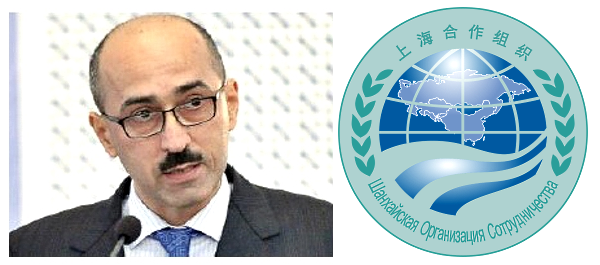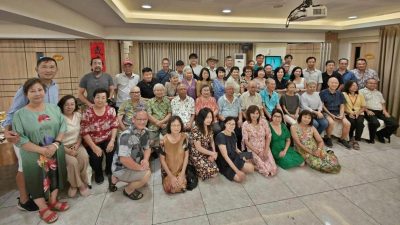
By Ardasher Saeedjaafar Qodiri
On November 10, 2020, the Republic of Tajikistan took over the chairmanship of the SCO (Shanghai Cooperation Organization) from the Russian Federation.
The country's chairmanship coincides with the 20th anniversary of the establishment of the Organization.
By the decree of the President of the Republic of Tajikistan, the Chairmanship Organizing Committee was established, headed by the Prime Minister of Tajikistan Kokhir Rasulzoda.
Also on October 8, 2020, the President of Tajikistan approved the Concept of the Chairmanship of the Republic of Tajikistan in the SCO in 2020-2021.
In accordance with the Concept, a Plan of Major Measures and a Plan of Domestic Measures of the Chairmanship have been developed, which cover over 100 events.
The country's chairmanship in the SCO is carrying out in accordance with the fundamental documents of the Organization and is aimed at the consistent implementation of the adopted international treaties, decisions, program documents and agreements recorded in the final documents of the meetings of the Council of Heads of States and the Council of Heads of Governments (Prime Ministers) of the SCO member states in for the progressive development of the Organization.
The chairmanship is based on the principles of equality, continuity, mutual understanding and respect for the opinion of each member state of the Organization.
The slogan of Tajikistan's chairmanship in the SCO: "20 years of the SCO: cooperation for stability and prosperity."
The Shanghai Cooperation Organization (SCO) is a permanent intergovernmental international organization, the creation of which was announced on June 15, 2001 in Shanghai (PRC) by the Republic of Kazakhstan, the People's Republic of China, the Kyrgyz Republic, the Russian Federation, the Republic of Tajikistan and the Republic of Uzbekistan. It was preceded by the Shanghai Five mechanism.
In 2002, on the basis of the 2001 Convention, in order to improve interaction in the fight against terrorism, separatism, extremism, drug and arms trafficking, as well as illegal migration, the Regional Anti-Terrorist Structure (RATS) was created, which received the status of a permanent SCO body. Its functions include coordinating the actions of law enforcement agencies and special services of the SCO states.
In June 2002, at the St. Petersburg Summit of the Heads of the SCO Member States, the Charter of the Shanghai Cooperation Organization was signed, which entered into force on September 19, 2003. This is the basic statutory document that fixes the goals and principles of the organization, its structure and main areas of activity.
Since 2003, the field of activity of the organization has been expanding. In 2003, the Heads of Governments of the SCO member states signed the Program of Multilateral Trade and Economic Cooperation for 20 years. In September 2004, at the Council of the SCO Heads of Governments in Bishkek, an action plan for the implementation of this program was approved.
At the meeting of the Council of Heads of SCO Member States in Ufa on July 10, 2015, it was decided to launch the procedure for admitting new members of the Organization – India and Pakistan. An agreement was reached on raising the status of participation in the work of the SCO of the Republic of Belarus to an observer state. In addition, Azerbaijan, Armenia, Cambodia and Nepal are joining the SCO family as dialogue partners.
On June 8-9, 2017, a historic meeting of the Council of Heads of States of the Shanghai Cooperation Organization was held in Astana, during which the status of a member state of the Organization was granted to the Republic of India and the Islamic Republic of Pakistan.
The total area of the SCO member states covers more than 30 million square kilometers, which is equal to 3/5 of the area of Eurasia, and the population of 3.2 billion people makes up 40% of the world's population, providing more than 20% of the world economy.
By uniting four nuclear powers – half of the world nuclear club – the SCO format is an additional pillar of the system for maintaining global strategic stability.
The main goals of the SCO include: strengthening mutual trust and good-neighborliness between the member states; promoting their effective cooperation in the political, trade, economic, scientific, technical and cultural fields, as well as in education, energy, transport, tourism, environmental protection and others; joint provision and maintenance of peace, security and stability in the region; advancing towards the creation of a democratic, just and rational new international political and economic order.
The supreme decision-making body in the SCO is the Council of Heads of Member States (CHS). It meets once a year and makes decisions and instructions on all important issues of the Organization. The Council of Heads of Governments (Prime Ministers) of the SCO Member States (SCO) meets once a year to discuss the strategy of multilateral cooperation and priority areas within the Organization, resolve fundamental and topical issues of economic and other cooperation, and also approve the annual budget of the Organization. The official languages of the SCO are Russian and Chinese.
In addition to meetings of the CHS and CHG, there is also a mechanism for meetings at the level of heads of parliaments, secretaries of security councils, ministers of foreign affairs, defence, emergencies, economics, transport, culture, education, health, heads of law enforcement agencies, supreme and arbitration courts, and prosecutors general.
The coordination mechanism within the SCO is the Council of National Coordinators of the SCO Member States (SNC).
The organization has two permanent bodies – the SCO Secretariat in Beijing and the Executive Committee of the SCO Regional Anti-Terrorist Structure (RATS) in Tashkent. The SCO Secretary General and the Director of the Executive Committee of the SCO RATS are appointed by the Council of Heads of States for a period of three years.
The SCO is regarded by many Western experts as an attempt to create a counterweight to NATO. However, according to its fundamental principles, the organization is not aimed against third countries.
It is also worth noting that the Business Council and the Interbank Association operate within the framework of this organization.
Taking the chairmanship, the Republic of Tajikistan approved the slogan: "20 years of the SCO – cooperation for stability and prosperity", and determined the main goals of its chairmanship to strengthen friendship and good-neighborliness between the SCO member states, maintain peace, security and stability in the region, increase cooperation in trade and economic, cultural and humanitarian spheres, strengthening the image and international positioning of the SCO and expanding the mechanisms of interaction.
In order to progressively and dynamically develop cooperation within the SCO and assist in further strengthening and enhancing its international image, the priority areas of Tajikistan's chairmanship in the Organization for 2020-2021 will be aimed at helping to deepen good-neighborly relations, friendship and cooperation between the SCO member states and strengthening internal consolidation, coordination of positions on regional and international issues affecting the interests of the Organization.
To maintain peace, security and stability, it is planned to strengthen practical cooperation in the fight against terrorism, separatism and extremism, drug trafficking, cybercrime, the spread of radical ideology and transborder organized crime.
The Tajik side also initiated the advancement of the issue of creating a separate SCO anti-drug body in order to mobilize forces and means into a single body to effectively counter drug trafficking.
The member countries of the Organization, in the framework of cooperation with the economic sphere, consider the adoption of joint measures to overcome the socioeconomic, financial and food consequences of the pandemic of the coronavirus infection in the region, and the prospects for strengthening and expanding cooperation in trade, financial, investment, transport, energy, agricultural spheres and food security, as well as in the field of small and medium-sized businesses.
The Shanghai Cooperation Organization attaches great importance to the areas of social and humanitarian cooperation, developing cooperation in the fields of education, culture, science, sports and tourism.
In a short period of its existence, the SCO has established itself at the global level, continuing the practice of cooperation with international organizations and practicing joint high-level events with such organizations as the UN and ASEAN.
On 25 March 2021, the 75th session of the UN General Assembly adopted by consensus Resolution 75/268 Cooperation between the United Nations and the Shanghai Cooperation Organization during its 58th meeting.
The document drafted by Tajikistan, which holds the SCO Chairmanship in 2020-2021, was co-authored by all the SCO member states plus Azerbaijan, Belarus, Cambodia, Kiribati and Costa Rica.
The resolution acknowledges the constructive role of the Shanghai Cooperation Organization in securing peace and security and recognizes the SCO as a crucial regional organization addressing security in the region, in all its dimensions, including in cooperation with relevant regional organizations.
The SCO member states intend to further strengthen foreign policy coordination within the UN and its specialized agencies, as well as on other international platforms, increasing interaction, conducting consultations and developing contacts through the ministries of foreign affairs, embassies and permanent missions of the SCO member states to the UN and other international organizations.
The SCO member states always express strong support for the coordinating role of the UN and its Security Council in strengthening international peace and security, stimulating global development, promoting and protecting human rights.
It is also worth highlighting the importance of cooperation between the SCO and ASEAN.
The SCO countries are geographically adjacent to the ASEAN countries, and are economically and culturally interconnected. Some SCO member states such as Russia, China and India have close cooperation with ASEAN. In November 2020, China entered into a Free Trade Agreement (Regional Comprehensive Economic Partnership – RCEP) with 14 countries in the Asia-Pacific region, including Malaysia. This document was signed following the results of the virtual summit of the ASEAN countries. It is worth noting that one of the ASEAN members, the Kingdom of Cambodia, is a dialogue partner. Another ASEAN member, Singapore, recently signed a free trade agreement with the Eurasian Economic Union, of which three SCO member states – Russia, Kazakhstan and Kyrgyzstan – are members.
Both the SCO and ASEAN regions have enormous economic potential, resource base, large skilled labor force and a huge market for goods and services, and combining their efforts can be mutually beneficial and mutually complementary.
Summarizing the above, it should be emphasized that the SCO is not a military bloc or a military-political structure. The mechanism of interaction between the SCO member states is limited to the security, economy, humanitarian sphere and, in accordance with its normative documents, provides for the non-use of force or the threat of force and excludes the conduct of military activities.
The Declaration on the Establishment of the SCO clearly states adherence to the goals and principles of the UN Charter and notes that the SCO's activities are not directed against other states.
The past decades of the Organization's activity clearly demonstrate that the SCO does not strive to become an economically integrated community over national governing bodies.
The mechanisms for ensuring security and stability, developed within the organization, and the legal and regulatory framework for cooperation based on mutual trust, ensure sustainable stability of further coexistence.
(H.E. Ardasher Saeedjaafar Qodiri is Ambassador Extraordinary & Plenipotentiary of the Republic of Tajikistan to Malaysia.)
ADVERTISEMENT
ADVERTISEMENT


































